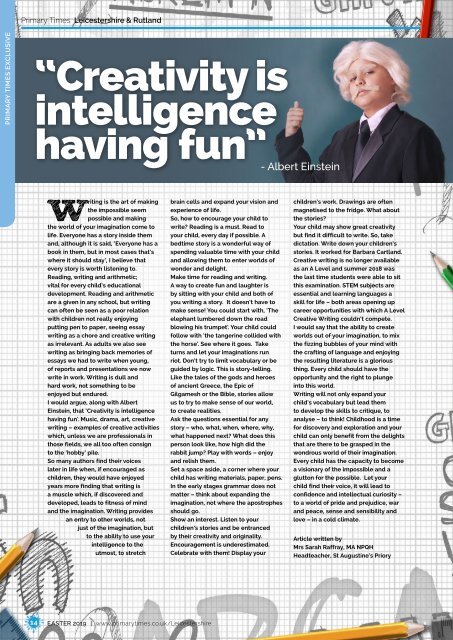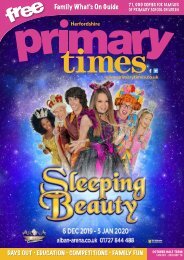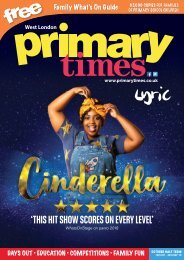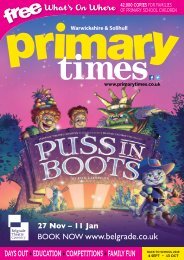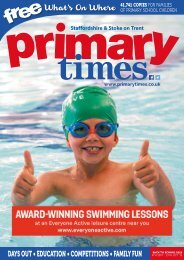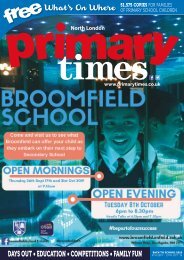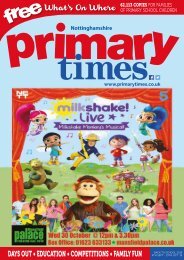PT LEICS EASTER 19 DIGITAL
You also want an ePaper? Increase the reach of your titles
YUMPU automatically turns print PDFs into web optimized ePapers that Google loves.
Primary Times Leicestershire & Rutland<br />
PRIMARY TIMES EXCLUSIVE<br />
“Creativity is<br />
intelligence<br />
having fun”- Albert Einstein<br />
Writing is the art of making<br />
the impossible seem<br />
possible and making<br />
the world of your imagination come to<br />
life. Everyone has a story inside them<br />
and, although it is said, ‘Everyone has a<br />
book in them, but in most cases that’s<br />
where it should stay’, I believe that<br />
every story is worth listening to.<br />
Reading, writing and arithmetic;<br />
vital for every child’s educational<br />
development. Reading and arithmetic<br />
are a given in any school, but writing<br />
can often be seen as a poor relation<br />
with children not really enjoying<br />
putting pen to paper, seeing essay<br />
writing as a chore and creative writing<br />
as irrelevant. As adults we also see<br />
writing as bringing back memories of<br />
essays we had to write when young,<br />
of reports and presentations we now<br />
write in work. Writing is dull and<br />
hard work, not something to be<br />
enjoyed but endured.<br />
I would argue, along with Albert<br />
Einstein, that ‘Creativity is intelligence<br />
having fun’. Music, drama, art, creative<br />
writing – examples of creative activities<br />
which, unless we are professionals in<br />
those fields, we all too often consign<br />
to the ‘hobby’ pile.<br />
So many authors find their voices<br />
later in life when, if encouraged as<br />
children, they would have enjoyed<br />
years more finding that writing is<br />
a muscle which, if discovered and<br />
developed, leads to fitness of mind<br />
and the imagination. Writing provides<br />
an entry to other worlds, not<br />
just of the imagination, but<br />
to the ability to use your<br />
intelligence to the<br />
utmost, to stretch<br />
brain cells and expand your vision and<br />
experience of life.<br />
So, how to encourage your child to<br />
write? Reading is a must. Read to<br />
your child, every day if possible. A<br />
bedtime story is a wonderful way of<br />
spending valuable time with your child<br />
and allowing them to enter worlds of<br />
wonder and delight.<br />
Make time for reading and writing.<br />
A way to create fun and laughter is<br />
by sitting with your child and both of<br />
you writing a story. It doesn’t have to<br />
make sense! You could start with, ‘The<br />
elephant lumbered down the road<br />
blowing his trumpet’. Your child could<br />
follow with ‘the tangerine collided with<br />
the horse’. See where it goes. Take<br />
turns and let your imaginations run<br />
riot. Don’t try to limit vocabulary or be<br />
guided by logic. This is story-telling.<br />
Like the tales of the gods and heroes<br />
of ancient Greece, the Epic of<br />
Gilgamesh or the Bible, stories allow<br />
us to try to make sense of our world,<br />
to create realities.<br />
Ask the questions essential for any<br />
story – who, what, when, where, why,<br />
what happened next? What does this<br />
person look like, how high did the<br />
rabbit jump? Play with words – enjoy<br />
and relish them.<br />
Set a space aside, a corner where your<br />
child has writing materials, paper, pens.<br />
In the early stages grammar does not<br />
matter – think about expanding the<br />
imagination, not where the apostrophes<br />
should go.<br />
Show an interest. Listen to your<br />
children’s stories and be entranced<br />
by their creativity and originality.<br />
Encouragement is underestimated.<br />
Celebrate with them! Display your<br />
children’s work. Drawings are often<br />
magnetised to the fridge. What about<br />
the stories?<br />
Your child may show great creativity<br />
but find it difficult to write. So, take<br />
dictation. Write down your children’s<br />
stories. It worked for Barbara Cartland.<br />
Creative writing is no longer available<br />
as an A Level and summer 2018 was<br />
the last time students were able to sit<br />
this examination. STEM subjects are<br />
essential and learning languages a<br />
skill for life – both areas opening up<br />
career opportunities with which A Level<br />
Creative Writing couldn’t compete.<br />
I would say that the ability to create<br />
worlds out of your imagination, to mix<br />
the fizzing bubbles of your mind with<br />
the crafting of language and enjoying<br />
the resulting literature is a glorious<br />
thing. Every child should have the<br />
opportunity and the right to plunge<br />
into this world.<br />
Writing will not only expand your<br />
child’s vocabulary but lead them<br />
to develop the skills to critique, to<br />
analyse – to think! Childhood is a time<br />
for discovery and exploration and your<br />
child can only benefit from the delights<br />
that are there to be grasped in the<br />
wondrous world of their imagination.<br />
Every child has the capacity to become<br />
a visionary of the impossible and a<br />
glutton for the possible. Let your<br />
child find their voice, it will lead to<br />
confidence and intellectual curiosity –<br />
to a world of pride and prejudice, war<br />
and peace, sense and sensibility and<br />
love – in a cold climate.<br />
Article written by<br />
Mrs Sarah Raffray, MA NPQH<br />
Headteacher, St Augustine’s Priory<br />
14<br />
<strong>EASTER</strong> 20<strong>19</strong> | www.primarytimes.co.uk/Leicestershire


